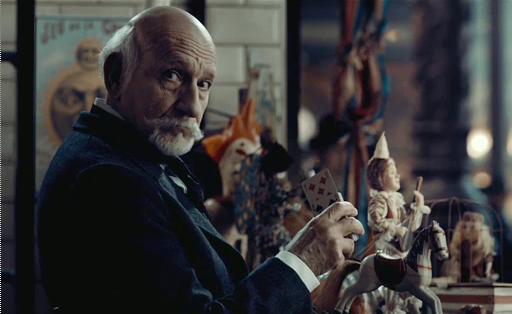Count me among those few unfortunates who didn’t “get” Hugo. Not that I failed to see what Martin Scorsese’s opulent adaptation of Brian Selznick’s graphic novel was trying to accomplish; but for me the movie’s attempt to channel and amplify a certain magic succeeded merely in bringing it leadenly to earth, burying a fragile tapestry of early-cinema memories beneath a giant cathedral (or in this case, a train station) of digital visual effects and overly literal storytelling. Some of my disaffection was likely due to viewing situation: I watched it flat and small, at home on my (HD)TV, rather than big and deep, and the lack of 3D glasses or IMAX overwhelm surely contributed to the lackluster experience. Yet I resist this bullying-by-format, and find it at odds with what Scorsese, through his marvelous machinery, appeared to be promoting: the idea that “movie magic” can blossom on the squarest of screens, the grainiest and most monochromatic of film stocks, not even needing synchronized sound to work its wonders on an audience.
I watched Hugo for a class I am co-teaching this term on the varieties of realism and “reality” deployed across multiple media, starting with early cinema’s dazzling blend of spectacularized “actuality” and suddenly plentiful illusion. Often reduced to a binary opposition between the work of Louis and Auguste Lumiere on the one hand and Georges Melies on the other, the era was more like the first femtoseconds following the Big Bang, in which cinema’s principal forces had not yet unfolded themselves from the superheated plasma of possibility. Hugo tries to take us back to that primordial celluloid soup, or more precisely to a fantasized moment — itself still hauntingly young — when the medium of film began to be aware of its own past, that is, to recognize itself as a medium and not, as one Louis Lumiere quote would have it, “an invention without a future.” Through an overwrought relay of intermediaries that includes a young boy and girl, a nascent cinema scholar, a dead father, a semifunctional automaton, and a devoted wife, that past is resurrected in the form of Melies himself, cunningly impersonated by Ben Kingsley, and it is the old magician’s backstory, dominating the final third of the film, that jolted both me and my students back to full, charmed attention.
I suppose there is something smart and reflexive about the way Hugo buries its lead, staging the delights of scholarly and aesthetic discovery through a turgid narrative that only slowly unveils its embedded wonders. But for me, too much of the movie felt like a windup toy, a rusty clockwork, a train with a coal-burning engine in dire need of stoking.

